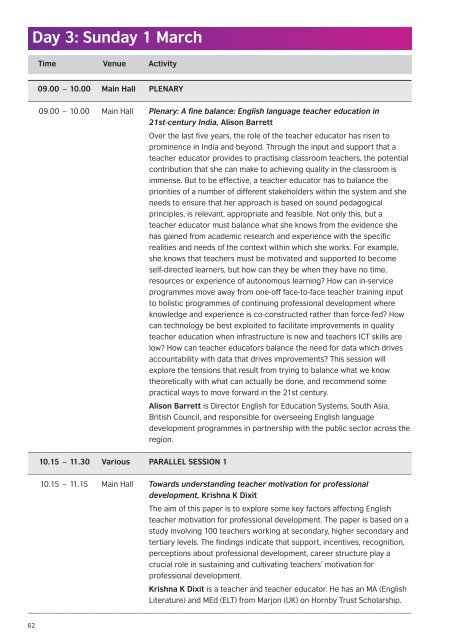tec_15_-_conference_brochure_low_res
tec_15_-_conference_brochure_low_res
tec_15_-_conference_brochure_low_res
You also want an ePaper? Increase the reach of your titles
YUMPU automatically turns print PDFs into web optimized ePapers that Google loves.
Day 3: Sunday 1 March<br />
Time Venue Activity<br />
09.00 – 10.00 Main Hall PLENARY<br />
___________________________________________________________________________________<br />
62<br />
09.00 – 10.00 Main Hall Plenary: A fine balance: English language teacher education in<br />
21st-century India, Alison Barrett<br />
Over the last five years, the role of the teacher educator has risen to<br />
prominence in India and beyond. Through the input and support that a<br />
teacher educator provides to practising classroom teachers, the potential<br />
contribution that she can make to achieving quality in the classroom is<br />
immense. But to be effective, a teacher educator has to balance the<br />
priorities of a number of different stakeholders within the system and she<br />
needs to ensure that her approach is based on sound pedagogical<br />
principles, is relevant, appropriate and feasible. Not only this, but a<br />
teacher educator must balance what she knows from the evidence she<br />
has gained from academic <strong>res</strong>earch and experience with the specific<br />
realities and needs of the context within which she works. For example,<br />
she knows that teachers must be motivated and supported to become<br />
self-directed learners, but how can they be when they have no time,<br />
<strong>res</strong>ources or experience of autonomous learning? How can in-service<br />
programmes move away from one-off face-to-face teacher training input<br />
to holistic programmes of continuing professional development where<br />
knowledge and experience is co-constructed rather than force-fed? How<br />
can <strong>tec</strong>hnology be best exploited to facilitate improvements in quality<br />
teacher education when infrastructure is new and teachers ICT skills are<br />
<strong>low</strong>? How can teacher educators balance the need for data which drives<br />
accountability with data that drives improvements? This session will<br />
explore the tensions that <strong>res</strong>ult from trying to balance what we know<br />
theoretically with what can actually be done, and recommend some<br />
practical ways to move forward in the 21st century.<br />
Alison Barrett is Director English for Education Systems, South Asia,<br />
British Council, and <strong>res</strong>ponsible for overseeing English language<br />
development programmes in partnership with the public sector across the<br />
region.<br />
___________________________________________________________________________________<br />
10.<strong>15</strong> – 11.30 Various PARALLEL SESSION 1<br />
___________________________________________________________________________________<br />
10.<strong>15</strong> – 11.<strong>15</strong> Main Hall Towards understanding teacher motivation for professional<br />
development, Krishna K Dixit<br />
The aim of this paper is to explore some key factors affecting English<br />
teacher motivation for professional development. The paper is based on a<br />
study involving 100 teachers working at secondary, higher secondary and<br />
tertiary levels. The findings indicate that support, incentives, recognition,<br />
perceptions about professional development, career structure play a<br />
crucial role in sustaining and cultivating teachers’ motivation for<br />
professional development.<br />
Krishna K Dixit is a teacher and teacher educator. He has an MA (English<br />
Literature) and MEd (ELT) from Marjon (UK) on Hornby Trust Scholarship.<br />
___________________________________________________________________________________


